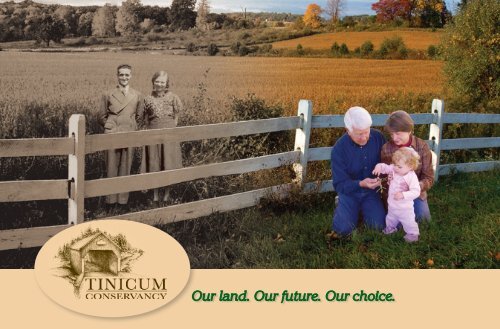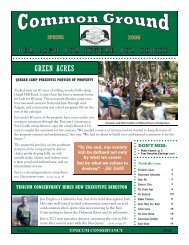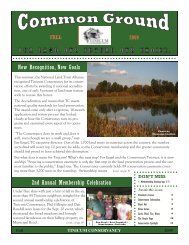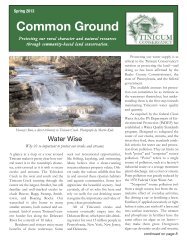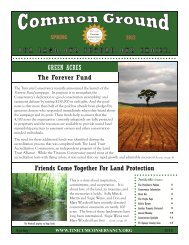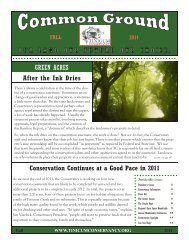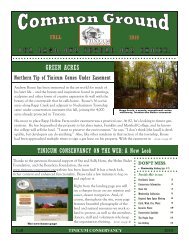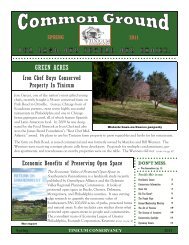Stories From Tinicum: New Conservancy Brochure tells the inspiring ...
Stories From Tinicum: New Conservancy Brochure tells the inspiring ...
Stories From Tinicum: New Conservancy Brochure tells the inspiring ...
Create successful ePaper yourself
Turn your PDF publications into a flip-book with our unique Google optimized e-Paper software.
Our land. Our future. Our choice.
Table of Contents<br />
Celebrating <strong>Tinicum</strong>’s Places and People ....... Pg. 1<br />
A family tree that keeps growing ................ Pg. 2<br />
Land conservation is contagious ................. Pg. 3<br />
Little steps make big footprints .................... Pg. 5<br />
Supporting conservation in <strong>the</strong>ir own way .... Pg. 6<br />
Giving back to <strong>the</strong> community ...................... Pg. 7<br />
Our reciprocal relationship with nature ......... Pg. 8<br />
Nature’s temporary caretakers .................... Pg. 9
Celebrating <strong>Tinicum</strong>’s Places and People<br />
Dear Friends of <strong>Tinicum</strong>,<br />
I don’t have to tell you that <strong>Tinicum</strong> is a very special place. Covering just 19,723 acres and home to fewer<br />
than 5,000 people, <strong>the</strong> township is a rich but fragile landscape of cascading streams, scenic vistas, wide-open<br />
meadows, contiguous forest and deep, dark hollows.<br />
During <strong>the</strong> past two decades, <strong>the</strong> <strong>Tinicum</strong> <strong>Conservancy</strong>, a nonprofit, 501(c)(3) organization, has partnered with<br />
conservation-minded landowners, concerned citizens and local government to preserve almost 90 properties<br />
and 3,700 acres—or 5½ square miles of <strong>the</strong> township. With <strong>the</strong> addition of properties preserved through o<strong>the</strong>r<br />
conservation and government programs, more than a third of <strong>the</strong> township is now protected for <strong>the</strong> benefit of<br />
current and future generations. This is a remarkable achievement, not only in Bucks County but also in <strong>the</strong><br />
Commonwealth of Pennsylvania.<br />
The <strong>Conservancy</strong>’s success has been as much a story of people as it has been about <strong>the</strong> land. The <strong>Conservancy</strong><br />
has been blessed with a group of landowners, volunteers, scientists and donors who share our common vision<br />
and have contributed to our accomplishments. Our supporters include farmers and weekend visitors; newcomers<br />
and lifelong residents; owners of small and large parcels; and o<strong>the</strong>rs who are concerned that <strong>the</strong> special nature<br />
and irreplaceable resources of <strong>Tinicum</strong> could be lost forever to become just ano<strong>the</strong>r suburb.<br />
This brochure celebrates our success through residents’ heartfelt stories and reflections on why <strong>the</strong>y think it is<br />
vital to protect <strong>Tinicum</strong>’s remaining open space. I am sure your reason for loving <strong>Tinicum</strong> will be reflected in<br />
one or two of <strong>the</strong>se stories that highlight your neighbors.<br />
If you haven’t already become involved with <strong>the</strong> <strong>Conservancy</strong>, I hope this brochure inspires you to do so. We all<br />
have a stake in protecting <strong>Tinicum</strong>’s future.<br />
Enjoy!<br />
Jim Engel<br />
Executive Director<br />
<strong>Tinicum</strong> <strong>Conservancy</strong><br />
[ 1 ]
A family tree that keeps growing<br />
The Quinbys have had roots deep in <strong>Tinicum</strong><br />
for six generations, stretching back to <strong>the</strong> mid-<br />
1800s. The family has run a building restoration<br />
and construction firm, collected taxes, raised<br />
cattle, and served on <strong>the</strong> board of supervisors.<br />
Preserving <strong>the</strong>ir land for generations to come<br />
seemed only natural. “It was always <strong>the</strong> intention<br />
never to develop <strong>the</strong> land,” says Todd Quinby,<br />
who has lived on or near <strong>the</strong> farm his entire<br />
life. “We never had a<br />
conversation about<br />
developing it.”<br />
That, says Todd’s<br />
older daughter, Patti Lynn, suits her just fine:<br />
“I would like to raise my kids in <strong>the</strong> same<br />
environment that I had.”<br />
The farm’s expansive acreage of fields and<br />
woods, which went under conservation<br />
easement in 2006, for years has been <strong>the</strong><br />
perfect nature center, campground, fishing<br />
spot, and driver’s ed course for young<br />
Quinbys. “The fields were our playground,”<br />
remembers James Quinby, Todd’s son.<br />
“I would like to raise my kids in<br />
<strong>the</strong> same environment that I had.”<br />
Todd’s great-great-greatgrandfa<strong>the</strong>r<br />
Aaron Kohl,<br />
who ran a bakery in<br />
Upper Black Eddy, bought<br />
<strong>the</strong> original parcel on<br />
Upper <strong>Tinicum</strong> Church<br />
Road in 1855. The family<br />
gradually added to <strong>the</strong> acreage as it expanded<br />
its farming operation—and became involved<br />
in <strong>the</strong> local community.<br />
An uncle helped with<br />
<strong>the</strong> 1930 census. Todd’s<br />
grandfa<strong>the</strong>r, John L.<br />
Quinby, was a Civil<br />
Defense volunteer during World War II. Todd’s<br />
fa<strong>the</strong>r, John, served as township supervisor in<br />
<strong>the</strong> 1960s and 1970s, and his mo<strong>the</strong>r, Joan,<br />
has been tax collector, auditor, and school<br />
board member.<br />
Even with <strong>the</strong>ir busy lives, John and Joan<br />
always had time for <strong>the</strong>ir family. “It was nice<br />
knowing <strong>the</strong>ir door was always open,” says<br />
Patti Lynn. Echoes Todd: “It was <strong>the</strong> same<br />
when my grandfa<strong>the</strong>r was here.”<br />
[ ] 2<br />
The Quinbys<br />
For <strong>the</strong> Quinby children—<strong>the</strong> sixth generation—<br />
<strong>the</strong> farm’s future as open space is secure. As<br />
<strong>the</strong>y launch into <strong>the</strong>ir own careers, <strong>the</strong>y know<br />
<strong>the</strong> family homestead is something <strong>the</strong>y can<br />
depend on, whe<strong>the</strong>r it’s watching bald eagles<br />
soar above <strong>the</strong> Delaware River or building a<br />
campfire for <strong>the</strong> annual family campout.
Land conservation is contagious<br />
Lisa BerkLey and david PhiLLips<br />
The strong sense of community drew Lisa Berkley<br />
and David Phillips to <strong>Tinicum</strong> Township—and<br />
that like-mindedness sustains <strong>the</strong>m.<br />
One by one, this former urban couple and <strong>the</strong>ir<br />
neighbors have put <strong>the</strong>ir land under easement<br />
through <strong>the</strong> <strong>Conservancy</strong>, so that today, a wide<br />
patchwork of fields, meadows and woods at<br />
Hollow Horn and Ervin Roads is protected<br />
from development.<br />
When Lisa and David first moved to <strong>Tinicum</strong><br />
in <strong>the</strong> late 1980s, <strong>the</strong>y plunged right into a<br />
“green” lifestyle. David volunteered with <strong>the</strong><br />
monthly recycling effort at <strong>the</strong><br />
township building and discovered<br />
a group of o<strong>the</strong>r environmentally<br />
sensitive people.<br />
“It was a great network,” he says.<br />
“That’s where we met people,<br />
people who were really concerned<br />
about <strong>the</strong> look and feel of <strong>the</strong><br />
land.” And having once lived in<br />
a densely populated area, <strong>the</strong><br />
couple understood <strong>the</strong> importance of<br />
preserving open space and <strong>the</strong> need for<br />
smart development.<br />
“This is one of <strong>the</strong> most beautiful areas of<br />
Bucks County,” Lisa says with unabashed<br />
pride. So when <strong>the</strong>ir neighbors, Diane and<br />
David Allison, preserved <strong>the</strong>ir land, <strong>the</strong>y were<br />
impressed. Diane’s bro<strong>the</strong>r, John Cole, who<br />
lives across <strong>the</strong> road from Lisa and David,<br />
followed suit. When <strong>Conservancy</strong> officials<br />
[ 3 ]<br />
showed up next at David and Lisa’s, to ask if<br />
<strong>the</strong>y would preserve <strong>the</strong>ir 30 acres, <strong>the</strong> answer<br />
was a resounding yes. “It was a complete<br />
no-brainer,” David recalls.<br />
“We have friends ...<br />
in o<strong>the</strong>r townships,<br />
and <strong>the</strong>y don’t have <strong>the</strong><br />
same sense of one-ness<br />
with <strong>the</strong> land.”<br />
Since <strong>the</strong>n, neighbors on<br />
ei<strong>the</strong>r side of David and<br />
Lisa have also said yes.<br />
Their section of Hollow<br />
Horn Road serves as one<br />
of <strong>the</strong> primary routes into<br />
<strong>the</strong> township, David points<br />
out. It gives visitors an<br />
important first impression.<br />
“Now,” he says, “people drive in and see a 70-<br />
acre farm field that’s mostly protected.”<br />
As actors, Lisa and David often travel to <strong>New</strong><br />
York—and run into city folk who know exactly<br />
where <strong>Tinicum</strong> Township is. “People know this<br />
place,” Lisa says. “We have friends who live in<br />
o<strong>the</strong>r townships, and <strong>the</strong>y don’t have <strong>the</strong> same<br />
sense of one-ness with <strong>the</strong> land.”
[ 2 ]
Little steps make big footprints<br />
Stu and Sally Horn support a handful of local<br />
environmental causes, but it’s <strong>the</strong> <strong>Tinicum</strong><br />
<strong>Conservancy</strong> and its work that give <strong>the</strong>m <strong>the</strong><br />
greatest satisfaction.<br />
“The <strong>Conservancy</strong> is doing things that we feel<br />
are meaningful,” Stu says. “They are tuned<br />
into what needs to be done—<strong>the</strong>y spend <strong>the</strong>ir<br />
money well.”<br />
The Horns’ generosity started with putting<br />
<strong>the</strong>ir seven acres along <strong>the</strong> Tohickon Creek<br />
under conservation easement—and donating<br />
a portion of <strong>the</strong> money <strong>the</strong>y received for that<br />
back to <strong>the</strong> <strong>Conservancy</strong>. “It was <strong>the</strong> right<br />
thing to do,” Stu says. They followed<br />
that up with o<strong>the</strong>r monetary donations,<br />
including a generous grant that funded<br />
this brochure.<br />
“Stu and Sally are an example of what makes<br />
supporters so critical to our organization,”<br />
says TC Executive Director Jim Engel. “Their<br />
contributions and <strong>the</strong> donations of o<strong>the</strong>r likeminded<br />
people in our community make it<br />
possible for us to achieve our goal—to protect<br />
our rural character and natural resources.”<br />
The Horns have been long-time residents of<br />
<strong>the</strong> township, although in <strong>the</strong> beginning, that<br />
residency was part time. They owned a weekend<br />
house on Bridge 5 along <strong>the</strong> Delaware<br />
River and commuted <strong>the</strong>re from Stu’s job with<br />
“The <strong>Conservancy</strong> is tuned into<br />
what needs to be done—<strong>the</strong>y spend<br />
<strong>the</strong>ir money well.”<br />
sTu and saLLy Horn<br />
Mobil Oil in Princeton, N.J. When he retired in<br />
<strong>the</strong> early 1990s, <strong>the</strong>y looked for a more<br />
permanent place and found it adjacent to Ralph<br />
Stover Park in <strong>the</strong> sou<strong>the</strong>rn part of <strong>the</strong> township.<br />
The Lenape camped <strong>the</strong>re long ago, and artist<br />
Wolfgang Roth, a previous owner who also<br />
loved <strong>the</strong> creek, had his ashes scattered <strong>the</strong>re.<br />
Stu and Sally delight in standing on <strong>the</strong> creek<br />
bank, savoring <strong>the</strong> sound of <strong>the</strong> ever-rushing<br />
water. The fact that <strong>the</strong>ir land is protected from<br />
development is critical to <strong>the</strong> Horns.<br />
[ 5 ]
andy Apgar and aLan BLack<br />
Supporting conservation in <strong>the</strong>ir own way<br />
A pooling of local resources. That’s <strong>the</strong><br />
intrinsic value of <strong>the</strong> <strong>Tinicum</strong> <strong>Conservancy</strong>,<br />
according to Alan Black and Randy Apgar,<br />
longtime donors.<br />
Because <strong>the</strong>ir single acre of property along<br />
River Road in Point Pleasant is too small for<br />
a conservation easement, Alan and Randy<br />
chose to support <strong>the</strong> <strong>Conservancy</strong> through<br />
generous yearly donations.<br />
“Maybe you would like <strong>the</strong> farm across<br />
<strong>the</strong> road from you to stay a farm,”<br />
says Alan. The way to do that,<br />
he says, is to come toge<strong>the</strong>r as<br />
a community to ensure that <strong>the</strong><br />
land remains open space.<br />
That’s why <strong>the</strong> <strong>Conservancy</strong>’s work<br />
is so vital, he says. It allows residents<br />
to have a stake in <strong>the</strong> future of <strong>the</strong>ir<br />
neighborhood. “We are fortunate to<br />
have <strong>the</strong>m in <strong>Tinicum</strong>,” Alan says.<br />
Alan, a Center City lawyer, and<br />
Randy, a consultant in <strong>the</strong> field of health care<br />
administration, first heard about <strong>the</strong> <strong>Conservancy</strong><br />
from Mitch and Sue Bunkin, both active in <strong>the</strong><br />
community, and jumped on board. “We could<br />
see what was happening down <strong>the</strong> road in<br />
Plumstead and Buckingham,” Alan says.<br />
Avid cyclists, <strong>the</strong>y witnessed <strong>the</strong> changing<br />
landscape, as rural roads turned into<br />
congested byways—except in <strong>Tinicum</strong>.<br />
“We love <strong>the</strong> beauty of it,” Alan says, <strong>the</strong>n<br />
chuckles. “We like to help out of a selfish interest.”<br />
“The <strong>Conservancy</strong> does a good job of keeping<br />
<strong>the</strong> issue of preservation in <strong>the</strong> public eye.”<br />
“It’s like it was 100 years ago,” Randy says of<br />
<strong>the</strong> township’s picturesque vistas. “That says<br />
a lot about <strong>the</strong> area. It’s important historically<br />
and artistically—artists come here to paint<br />
what we enjoy seeing.”<br />
“The <strong>Conservancy</strong> does a good job of keeping<br />
<strong>the</strong> issue of preservation in <strong>the</strong> public eye,”<br />
Randy says. “We certainly promote what <strong>the</strong>y<br />
are doing.”<br />
[ 6 ]
Giving back to <strong>the</strong> community<br />
Ask around <strong>Tinicum</strong> Township to find out what<br />
Kris Becker does and <strong>the</strong> list keeps growing:<br />
• She designs and lays out <strong>the</strong> biannual<br />
<strong>Tinicum</strong> <strong>Conservancy</strong> newsletter.<br />
• She designs and helps with various<br />
mailings for <strong>the</strong> <strong>Conservancy</strong> effort.<br />
• She monitors more than 400 acres for<br />
<strong>the</strong> <strong>Conservancy</strong>, usually on horseback.<br />
And that’s just for <strong>the</strong> <strong>Conservancy</strong>.<br />
Kris and her husband, Jerome, also clean up a<br />
two-mile section of local roadway, a volunteer<br />
effort through <strong>the</strong> state’s Adopt-a-Highway<br />
program. Kris serves on one of <strong>the</strong> township’s<br />
committees and is “placemat queen” for <strong>the</strong><br />
<strong>Tinicum</strong> Civic Association’s annual Art Festival,<br />
while Jerry, after serving two years on <strong>the</strong><br />
<strong>Conservancy</strong> Board, now volunteers with <strong>the</strong> area<br />
Fire Police, responding to local emergencies.<br />
Their reason for such involvement is simple,<br />
Kris says: “Until I moved here, I didn’t realize<br />
how much a small community depends on<br />
volunteers.”<br />
Once upon a time, <strong>the</strong> Beckers were highoctane<br />
<strong>New</strong> Yorkers, living on <strong>the</strong> 34th floor of<br />
a Manhattan apartment building, but, after<br />
“We felt embraced by <strong>the</strong> community<br />
and wanted to know what we could do<br />
to help protect it.”<br />
20 years, city life was wearing thin. “I reached<br />
<strong>the</strong> point where I was losing perspective,”<br />
Kris says. “It was literally, find a weekend<br />
place or move out of <strong>the</strong> city.”<br />
They moved to <strong>Tinicum</strong> in 1994 and put <strong>the</strong>ir<br />
5.5 acres under conservation easement five<br />
years later. The switch to rural life was like<br />
coming home, she says. She grew up in<br />
Indiana farm country and missed <strong>the</strong> open<br />
spaces and elbow room of her childhood.<br />
In <strong>Tinicum</strong>, <strong>the</strong> Beckers quickly found a circle<br />
of friends and a neighborhood vibrant with<br />
kris and Jerome Becker<br />
energy. “We felt embraced by <strong>the</strong> community<br />
and wanted to know what we could do to help<br />
protect it,” she says.<br />
One volunteer project led to ano<strong>the</strong>r—and<br />
ano<strong>the</strong>r. But she and Jerry don’t resent <strong>the</strong><br />
time <strong>the</strong>y spend helping out. “This is our<br />
home. I’m doing this for me as much as for<br />
<strong>the</strong> community,” Kris says.<br />
[ 7 ]
ann Rhoads, ph.d.<br />
Our reciprocal relationship with nature<br />
<strong>Tinicum</strong> Township is full of hidden treasures, a<br />
quiet glen here, a moss-covered outcropping<br />
<strong>the</strong>re. But one treasure is hidden in plain<br />
sight—<strong>the</strong> 2,053-acre Roaring Rocks-Swamp<br />
Creek watershed.<br />
Although <strong>the</strong> o<strong>the</strong>r major watersheds in <strong>the</strong><br />
township had long been studied and surveyed,<br />
RR-SC remained a<br />
“forgotten” area until<br />
2005, when a team of<br />
area scientists, led by<br />
<strong>Tinicum</strong> <strong>Conservancy</strong><br />
Pretty scenery offers a bonus that<br />
goes beyond aes<strong>the</strong>tics: It helps<br />
keep <strong>the</strong> air and water clean.<br />
researcher and<br />
conservationist<br />
Marion Kyde, Ph.D.,<br />
took an in-depth look<br />
at it. The team, which included environmental<br />
experts from <strong>the</strong> Morris Arboretum, Churchville<br />
Nature Center, and Natural Lands Trust, spent<br />
nearly two years painstakingly taking an inventory<br />
of <strong>the</strong> watershed. They counted mammals<br />
and birds, amphibians and reptiles, trees and<br />
plants, and even fungi. They studied <strong>the</strong> varied<br />
habitats scattered across <strong>the</strong> watershed.<br />
What <strong>the</strong>y found in that sparsely populated area<br />
were unbroken forests, rich meadows and<br />
pristine water. The watershed is home to 327<br />
species of plants—two of <strong>the</strong>m rare, 17 species<br />
of mammals, 15<br />
species of amphibians,<br />
10 species of reptiles<br />
and 111 species<br />
of birds.<br />
The wealth of plant<br />
and animal life in <strong>the</strong><br />
watershed was no surprise to at least one of<br />
<strong>the</strong> team members—Morris Arboretum senior<br />
botanist Ann Rhoads, Ph.D. That’s because<br />
she’s been studying <strong>the</strong> township off and on<br />
for years.<br />
Although Dr. Rhoads has done research across<br />
Pennsylvania, she finds <strong>Tinicum</strong> especially<br />
fascinating. The diabase geology that’s<br />
prevalent throughout <strong>the</strong> area has helped<br />
preserve <strong>the</strong> land’s natural beauty. The rocky<br />
ground, she says, “prevented <strong>the</strong> clearing of<br />
forests for large-scale agricultural use.”<br />
When Dr. Rhoads begins an environmental<br />
study of an area, she looks at what she calls<br />
<strong>the</strong> “ecological services”—those processes <strong>the</strong><br />
habitat carries out that we depend on—<strong>the</strong><br />
sequestering of carbon dioxide in <strong>the</strong> trees,<br />
<strong>the</strong>ir release of oxygen and <strong>the</strong> filtering of water.<br />
The nature lover has birds to watch, plants to<br />
see and fish to catch, she says, but <strong>the</strong> pretty<br />
scenery offers a bonus that goes beyond<br />
aes<strong>the</strong>tics: It helps keep <strong>the</strong> air and water<br />
clean. “The <strong>Tinicum</strong> <strong>Conservancy</strong>’s work helps<br />
to preserve that ... in <strong>the</strong> lands around us.”<br />
[ 8 ]
Nature’s temporary caretakers<br />
norman MacarThur<br />
and biLL Novak<br />
When Norman MacArthur and Bill Novak first<br />
moved to <strong>Tinicum</strong>, <strong>the</strong> area seemed like “<strong>the</strong><br />
end of <strong>the</strong> world.” But <strong>the</strong>y soon understood<br />
that <strong>the</strong> pristine countryside was what <strong>the</strong><br />
township was all about.<br />
“We bought 50 acres in <strong>Tinicum</strong> Township<br />
and realized what a huge responsibility this<br />
represented,” Norm says. “We considered<br />
ourselves <strong>the</strong> temporary caretakers of this<br />
beautiful piece of land. We had to do something<br />
to make sure it would be<br />
permanently protected.”<br />
Soon after <strong>the</strong>y moved into<br />
Jugtown Hill Farm with its<br />
200-year-old house and barn,<br />
<strong>the</strong>y became aware of <strong>the</strong><br />
work being done by <strong>the</strong><br />
<strong>Tinicum</strong> <strong>Conservancy</strong>. Here was a way to work<br />
toward <strong>the</strong>ir goal. The presence of a local<br />
land trust was an indication that people in<br />
<strong>Tinicum</strong> were committed and willing to work to<br />
conserve land. There was still time to really<br />
make a difference!<br />
Their love of preservation had its beginnings<br />
in Park Slope, Brooklyn, where <strong>the</strong>y lived<br />
for almost 30 years. Both had professional<br />
careers, but each also did volunteer work to<br />
“We had to do something<br />
to make sure it would be<br />
permanently protected.”<br />
improve Brooklyn’s Prospect Park. Norm<br />
and Bill brought to <strong>Tinicum</strong> <strong>the</strong>ir spirit of<br />
volunteerism and community involvement.<br />
Bill helps to run <strong>the</strong> <strong>Tinicum</strong> Arts Festival,<br />
<strong>the</strong> Stover Mill Gallery and <strong>the</strong> juried exhibit<br />
at Phillips’ Mill. Norm<br />
chairs <strong>the</strong> <strong>Tinicum</strong><br />
Open Space Commission<br />
and is a former Trustee of<br />
<strong>the</strong> <strong>Conservancy</strong>.<br />
The <strong>Conservancy</strong> helped<br />
Norm and Bill through <strong>the</strong><br />
process of donating a conservation easement<br />
on <strong>the</strong>ir property. “Even if everything else got<br />
developed, at least <strong>the</strong>se 50 acres would be<br />
saved,” Norm says. Norm and Bill were also<br />
able to take a charitable tax deduction for <strong>the</strong><br />
contribution of <strong>the</strong>ir development rights—a<br />
very nice bonus.<br />
“We drive down <strong>the</strong>se beautiful roads, and we<br />
can’t believe how lucky we are to live here,”<br />
Norm says. “It’s a privilege!”<br />
[ 9 ]
P.O. Box 206, Erwinna, PA 18920<br />
• • •<br />
Office Location: 965 River Road, Upper Black Eddy, PA 18972<br />
610-294-1077 • www.tinicumconservancy.org<br />
This brochure is made possible by generous support from Stu and Sally Horn • Written by Dianna Sinovic • Photos by Maureen Santina


